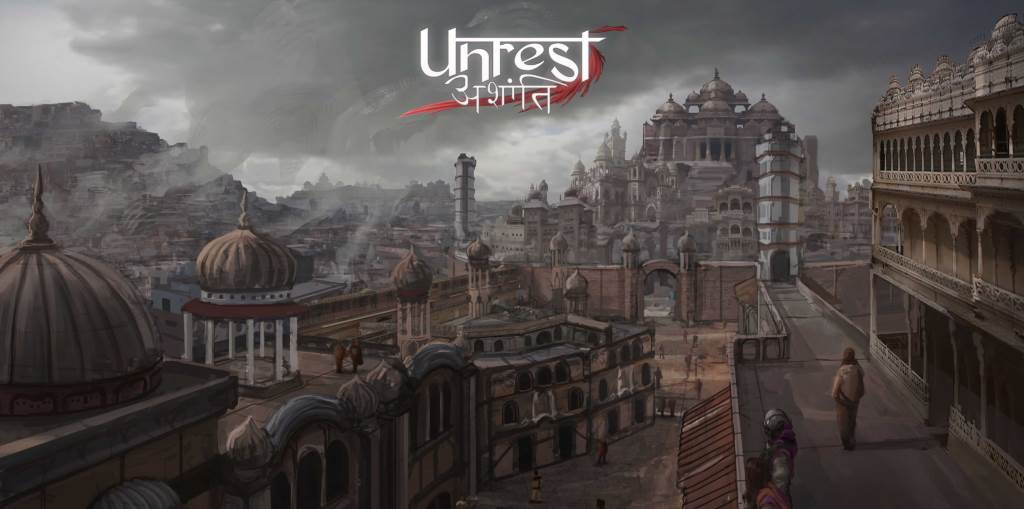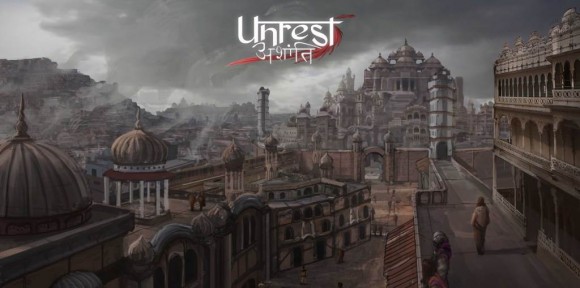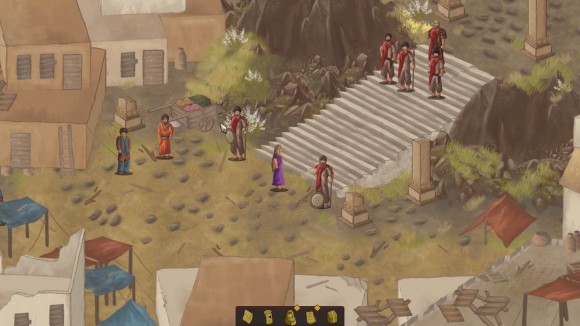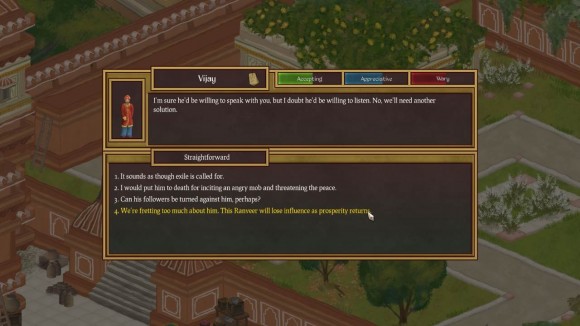I am a young peasant girl in an impoverished village. I enjoy the unique advantage of natural intelligence and a minimal education – unlike many in my local community, I am able to read. Unfortunately this leaves me with a degree of natural arrogance. My education, defiant nature and sense of self-worth make me feel that I deserve something better than the life others have mapped out for me. Educated or not, those whom I live among do not all share this point of view. The drought that has now lasted over a year certainly does nothing to dampen tensions.
As I turn fifteen, my parents tell me that I am to marry. But it is to the son of a local merchant family, Hanu – a brat widely regarded as stupid and ill-tempered! I react poorly, lashing out at my parents for attempting to shackle me to such an awful man. But my mother snaps back just as hard: they have worked hard and given much to make this union possible. Hanu’s family, being merchant caste, offer perhaps the only opportunity for me to ever leave this village and make something more of my life.
But is this the only option? My best friend, Juhi, seems to think so. She loves and admires me so much, perhaps because she has always seen me as different to all the other children here.
I resolve to meet with Hanu and his family. Can he really be as bad as my memory and friends suggest?
On the way to Hanu’s home I run into a terrifying creature, one I might ordinarily avoid or hide from, but today I am angry and bold. I approach it directly and we speak. It is the Naga merchant who comes here, every few months, with goods for Laxmi, the noble who rules our village with cold cruelty and armed guards. It turns out that the Naga is a little bemused as to why no villagers ever approach. Throwing caution to the wind, I speak directly and tell him – her? it? – that we are simple people and an eight-foot snake is inherently terrifying. He accepts this, but notes that in Bhimra – the once-great city that rules over our lands – starvation and desperation sees Naga refugees threatened by the humans they live among. It is the first I have heard of Bhimra in a very long time. The first since I heard that the Royal family died.
I end up making a trade with the Naga merchant, who is impressed by the wooden toys my father carves. Although the money he gives me is not that of our people, it is still money that might help support my parents – or give me another option if Hanu really is all that bad.
Hanu’s family react poorly to me. His older sister, already married, is direct. To her I am less than nothing. Her only family is that she married into. As I leave, rebuffed, I am already beginning to doubt my decision to try and bolster the relationship between my family and Hanu’s, between me and… my possible future husband. Have my parents really done the right thing?
I can tell that Hanu’s mother does not like or respect me, but she is not openly hostile – unlike his father, who seems as if he would strike me were I not to be betrothed to his son. Neither have any words for me, so at last I steel my nerves and approach Hanu.
It could not have gone any worse. He is angry, petulant and rude. He feigns to be shocked and insulted that I am his wife to be. He says that I am “not even pretty”. He throws a necklace at my feet before refusing to speak with me any further, stating that he was told to give it to me as a gift. I pick it up as I leave: it is old, hand-made, and well-worn. Somebody loved this necklace.
As I leave their home, Hanu’s mother stops me. She is no warmer than before, but she appears slightly grateful that I carried myself better than her son. She pleads with me to try and work with him – to try and make him better. It has been a tough time for him, she tells me, for her and all of their family. Perhaps telling me too much, she reveals that they are deeply in debt – and only the dowry my father will offer alongside me, savings built up through my father’s sideline in toymaking – gives them a way out. They are desperate. No wonder Hanu’s father wanted to strike me. He is humiliated, a merchant being bailed out by peasants.
But those are their problems. Should they be mine? Do I marry Hanu, doing what’s right in the eyes of my family, and hope that a better future may come? Do I attempt to sabotage the marriage? My friend Juhi seems to expect this off me. Or I could even flee the village – a dangerous option with no promise of anything better, but an option nonetheless.
—
Unrest has been in development for several years now. It’s another successful Kickstarter story; originally asking for only $3,000, it ended up with just over $36,000 from almost two thousand backers. Happily, while many of the project’s stretch goals involve the usual technical upgrades and visual fluffery, equally as many relate to new characters and stories. As you might imagine from the story I recounted above, this is where Unrest shines and where it promises something genuinely different.
Although combat is to be a part of the game – I’ve not yet encountered any myself but it has been mentioned on the Kickstarter page – it’s your interactions with others and the way your choices affect them and the characters you control that is significant.
I know you’ve heard this sort of thing promised before with many an RPG, so bear with me. Mechanically Unrest is built upon a familiar concept. Each character you encounter has three attitude stats: friendliness, respect and fear. These have default positions depending on who they are, who you are, and how the context of your lives defines your existing relationship, but you can affect them through your choices. It is hard to make someone who despises you like you, for example, but you may be able to get them to grudgingly respect you.
Unrest builds on top of this simple set of systems with some excellent, thoughtful writing. It’s probably possible to blunder in and act like the kind of narcissistic sociopath RPG heroes usually are, looking out only for yourself and caring not a whit for the feelings or opinions of others, but I imagine you would not get far. It’s very easy to upset or offend others in Unrest, and once a conversational decision is made there’s no going back to explore the rest of the dialogue tree or revoke your decision. There’s even an Iron Man mode to remove the temptation toward save-scumming – which thus far I’d heartily recommend switching on.
The writing in Unrest really stands out in a number of areas. First among these is the way in which each character is situated within the context of a life that has brought them to where they are today. This sounds like a ridiculous thing to single out, but how many games offer you this or that tidbit of backstory before dumping you, instantly or an hour in, into a hackneyed ‘save the world from the ultimate evil’ tale – after which your background is entirely irrelevant?
In Unrest you play as multiple characters, including peasant girl Tanya, royal princess Asha, a Naga diplomat, and a newly ordained priest. Each character spends a chapter essentially doing what is expected of them. Tanya’s decisions all fall within the context of the marriage that has been arranged for her and her social position within the village, as defined by her caste. The Naga diplomat must tread carefully in the field of human politics, discussing deals with the royals of Bhimra and looking out for the interests of the Naga empire. And so on.
Everyone you meet has their own motivations, fears and own opinions. Although you can see how characters regard you you don’t necessarily know why they feel as they do, or know how they’ll react to different conversational approaches and statements.
A man asks you what ‘those Naga are hissing about’ – do you tell him, or do you not? A stranger tells you that he is from a village that rose up against its masters and was put down violently – do you brashly talk with him further, or flee lest your conversation be seen by guards? A small beggar boy warns you of impending danger, offering to help you up – but what are his motivations for doing so?
I’m genuinely fascinated with the stories that are unfolding in Unrest. Their focus does not lie exclusively upon the rich and powerful, either: it is acknowledged that the powerless too have problems that must be navigated in their lives. The game also makes it emphatically clear that often there is no correct or good decision: there is often only the one you make, and those you must live with.
Further, the game’s themes – political upheaval in the context of widespread starvation, the falling back on violence to preserve order, the everyday cruelties endured by the poor, and living with consequences – are of actual relatable interest to human beings, unlike the heroic power fantasies and insulting simple moral frameworks of so many RPGs. This is not to mention that its fantastical setting draws on the cultural, political and architectural legacies of India, eschewing the usual ground-up milieu of European feudalism.
That’s not to say it’s a flawless offering. Although its visuals have a certain charm – the hand-painted aesthetic has appeal – the game engine is fairly crude and characters float and slide over the ground as they move. Playing with a controller, which I found I preferred to, sometimes resulted in my struggling to exit conversations, and I often found myself switching over to the mouse to read tidbits of lore about characters I’d encountered. I’ve also not yet experienced any combat. There’s always the risk it could be awful. And the game did crash once, although it had auto-saved perfectly.
Unrest was released on Wednesday July 23rd and is available direct from Pyrodactyl Games or via various digital distributors. It is inexpensive. It is making me play in a way that I typically would not, experiencing stories that I would not often expect to find in a game. Make your choice.




Comments
4 responses to “Spotlight: Unrest”
Sounds very, very promising.
I'm hoping it can sustain what's gotten me interested over the game's full length – or even better, impress me further.
So have you played it more and what is the verdict? Asking for a friend.
I actually haven't as yet, though it's on the relatively short list of games (about 40) that I currently plan to play more of.